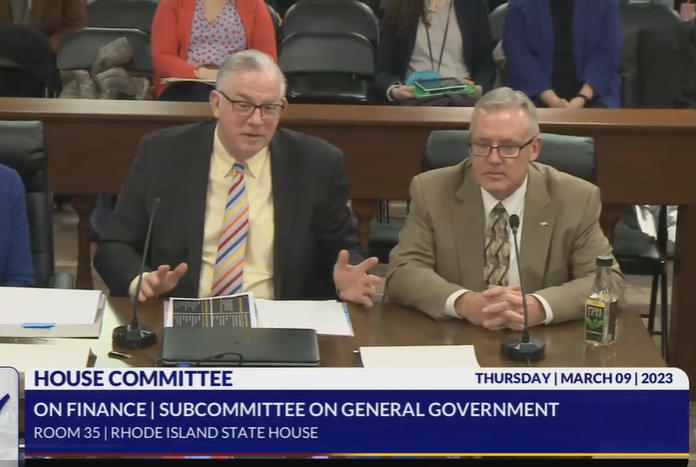Rhode Island AG orders governor to turn over email related to alleged misconduct by state official
PROVIDENCE – Attorney General Peter Neronha has ordered Gov. Dan McKee to make public an email from a state contractor alleging misconduct by one or more state officials during a business trip to Philadelphia in March.
"Disclosure of the email could be very damaging to the reputation of the employees who are the subject of the email," wrote Asst. Atty. Gen. Katherine Sadeck in a response Wednesday to appeals filed by The Journal and WPRI-TV of McKee's refusal to make the email public.
However, "there is a public interest in allegations regarding how high-level state officials openly acted in front of third parties while they were in the course of representing the State of Rhode Island," she wrote.
"Accordingly, the governor's office violated the [Access to Public Records Act] by withholding the email and it must be disclosed," within five business days, she wrote.
“Our office is currently reviewing the Attorney General’s decision," McKee spokeswoman Olivia DaRocha told The Journal. "Separately, I can confirm for you that the incident involving Mr. Patten was referred by our office to the State Police in mid-April.”
There are no fines attached to the attorney general's ruling, which concludes: the violation was not "willful and knowing or reckless."
"The record indicates that the Governor’s Office applied the balancing test in good faith and we confirm that there is a privacy interest in the withheld record, albeit an interest that we find outweighed by the public interest."
The email at issue was sent to McKee's office, shortly after the March 10 visit, by principals in Scout Ltd., which is the urban design company under state contract to develop a $56 million plan for the renovation of the Cranston Street Armory.
It centered on the allegedly inappropriate behavior of David Patten, the director of the state's property-management division. Patten visited Philadelphia with then-Administration Director James Thorsen to see work done previously done by Scout on a former vocational school.
On the Friday they returned from the one-day trip to Philadelphia, Thorsenreportedly went directly from the airport to a 4 p.m. meeting with someone from Human Resources and days later offered to pay personally for the $250 lunch that day at a high-end Sicilian restaurant, according to the limited information provided by the administration.
The "email discusses two particular government employees and our in camera review confirms Deputy Personnel Administrator [Pamela] Moscarelli’s characterization of the email as containing “allegations of misconduct'," the attorney general's office wrote.
After viewing the email, the attorney general concluded: it "includes evidence to support some of its allegations and constitutes at least some evidence of official misconduct by one or more high ranking official(s)."

Why didn't McKee's office release the email?
In refusing to make the email public, McKee's State House lawyer Andrea Shea contended it was an off-limits personnel record, and its release "would constitute a clearly unwarranted invasion of personal privacy," for Patten, who went on unpaid medical leave days after the Philadelphia trip and is currently on paid administrative leave.
Thorsen has since left the McKee administration for a job with the U.S. Treasury.
Journal's lawyers: Email is not a 'personnel record'
In rebuttal, The Journal's lawyers at Greenberg Traurig argued that the email Scout sent the governor relative to the alleged misconduct of a state official is not a "personnel record" as the term has been defined by the U.S. Supreme Court and is ordinarily understood.
A personnel record contains “vast amounts of 'personal data' used to profile an individual for employment-related reasons, such as where [an individual] was born, the names of his parents, where he has lived ... his high school or other school records, results of examinations, [and] evaluations of his work performance," they wrote.
By contrast, the email at issue here is "from an out-of-state private entity looking to expand its business with the state that details the entirely public conduct of a public official."

In balancing any potential privacy interest against the public's interest, The Journal argued: "The public has an intense and unique interest in disclosure. The inappropriate conduct allegedly engaged in by Mr. Patten occurred as part of due diligence efforts associated with a significant public development project."
"The public likewise has a strong interest in understanding whether the conduct of public officials while acting in a representative capacity has the potential to inappropriately influence the business relationship between Scout and Rhode Island," The Journal argued.
"Allowing the Agency to insulate the email from public disclosure by way of its own self-serving characterization of the email would circumvent APRA’s very purpose."
In its own ruling, the attorney general's office knocked down the McKee lawyer's argument, including the attempt to label the email off-limits because it is an "investigatory record."
"The Superior Court previously examined the meaning of “investigatory records” and concluded they “are those records which originate in or are generated during the course of an investigation... Concerned that this exemption could be used to circumvent the APRA, the Superior Court held that “[t]he so-called ‘investigatory exemption’ exempts records created or generated by an investigating agency. That is all it does.
"It does not serve as a magic wand turning open-access records into shielded records merely because those records are also being used in the course of an investigation,"' the attorney general's office, citing an earlier case instigated by The Journal, concluded.
In this case, the email in question was "a communication from a third-party that led DOA to decide to commence an investigation into one or more state employees."
"Exempting such a record would risk allowing a public body to convert “open-access records into shielded records merely because those records are also being used in the course of an investigation,” something the Superior Court expressly held was against the intent of the APRA," the attorney general wrote.
No money in the budget for the Armory redevelopment
There is no money in the proposed $14 billion state budget bill to proceed with the Armory renovation. It is unclear whether the contractor's complaint factored into that decision, though House budget writers said a financial analysis of the proposal is not complete.
The Cranston Street Armory is a 190,000-square-foot historic facility that has been mostly closed to the public since 1981, when it was deemed structurally unsafe.
More: RI budget, topping $14B for first time, wins initial approval. Here's what's in it – and not
While the state had considered previous redevelopment plans, its efforts in this regard historically were thwarted by high costs. In February 2020, the Department of Administration again sought proposals.
As explained in The Journal filing with the attorney general: Scout Ltd. submitted a bid which proposed a $56 million redevelopment plan for the Armory. In June 2022, Scout entered into a Memorandum of Agreement with the State of Rhode Island, that deemed Scout the “master developer” for the Armory if the state decided to proceed, and set terms for an initial $400,000 engagement.
Patten signed the contract documents, in his role as director of the Division of Capital Asset Management and Maintenance (“DCAMM”), within the Department of Administration. .
In this role, the Journal argued, Patten "has been intimately involved in the State’s plans to develop the Armory and negotiations with Scout in this regard. Notably, the MOA was signed by Mr. Patten on behalf of the State."
This article originally appeared on The Providence Journal: The Providence Journal's APRA appeal ruled on by AG Neronha

